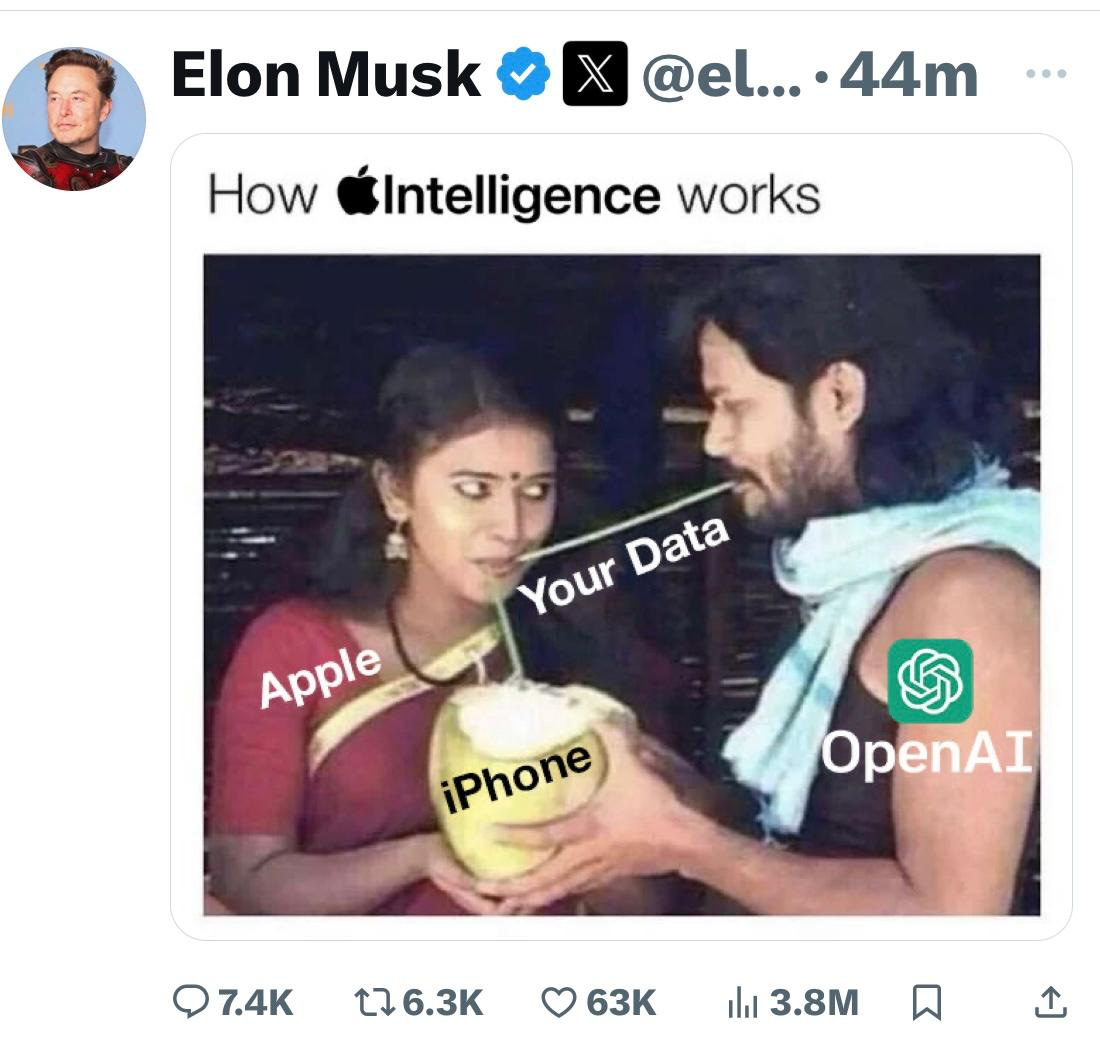"Apple Intelligence" Launch Triggers Privacy Red Flags
Elon Musk leads the "privacy" onslaught, threatening to ban entry of Apple devices into his factories, such as Tesla. Visitors will have to deposit these devices at entry, to be kept in a Faraday Cage
Unveiling “Apple Intelligence”
At the Worldwide Developers Conference 2024 held at its Cupertino, California headquarters, Apple on Monday (10th June) unveiled its latest technological advancement, "Apple Intelligence." This new feature integrates advanced artificial intelligence capabilities into Apple's ecosystem, largely leveraging OpenAI’s ChatGPT, promising enhanced capabilities and improved user experiences. However, with these announcements, Apple also faced immediate privacy concerns from tech reviewers, including tech billionaire Elon Musk.
On-Device Processing
A cornerstone of Apple's approach to AI is performing much of the processing on the user's device rather than relying on the cloud. This method is intended to enhance privacy and security by keeping personal data within the user's control. On-device processing means that sensitive information does not need to be sent to remote servers, reducing the risk of data breaches and unauthorised access.
Private Cloud Compute
When more complex AI tasks necessitate cloud processing, Apple has introduced Private Cloud Compute. This innovation allows AI models to run on dedicated Apple servers while employing privacy-preserving techniques such as obscuring IP addresses. This dual approach aims to balance the need for powerful AI processing with robust privacy protections.
Transparency and User Control
Apple is also prioritising transparency and user control. Users will be asked for explicit permission before their questions or data are sent to ChatGPT. Furthermore, ChatGPT will not store these requests, ensuring that user data is not retained unnecessarily. This approach is designed to build user trust and provide clear choices about data sharing.
Independent Code Inspection
To further build trust, Apple has committed to allowing independent experts to inspect the code running on their AI servers. This measure is intended to verify the effectiveness of Apple's privacy safeguards and provide reassurance to users and privacy advocates alike.
Scope of Data Use and Third-Party Partnerships
Despite these efforts, there are still significant concerns about the scope of data use. Even with robust privacy measures, Apple's AI will have access to deeply personal data from users' devices. Additionally, Apple's partnership with external AI entities like OpenAI raises questions about data sharing with third parties. Critics worry that, despite Apple's assurances, user data could still be exposed to external entities.
Potential for Abuse and Unintended Consequences
As with any powerful new technology, there is the potential for abuse or unintended consequences. Advanced AI systems, despite their safeguards, may be manipulated or misused in ways that could compromise user privacy and security. These concerns underscore the need for ongoing vigilance and transparency from Apple.
Elon Musk's Strong Reaction
Elon Musk, a prominent figure in the tech industry, expressed strong negative reactions to Apple's integration with OpenAI's ChatGPT. Following the announcement, Musk threatened to ban Apple devices from his companies, including Tesla and SpaceX, if Apple integrates OpenAI technology at the operating system level. He called this an "unacceptable security violation" and criticised Apple for handing user data to OpenAI without sufficient safeguards.
Musk accused Apple of lacking the capability to develop its own AI technology and compromising user privacy. He tweeted, "Apple is selling you out, handing your data over to OpenAI without a second thought." Musk also criticised Apple for using the phrase "protect your privacy" while sharing data with OpenAI, calling it "bullshit" and accusing Apple of misleading users.
Summing Up: Never Underestimate Privacy Concerns
Privacy concerns should not be underestimated by Apple. Historical precedents, such as Microsoft's controversial feature of unobtrusively capturing desktop screenshots, which they later had to make an opt-in feature, highlight the sensitivity of privacy issues. The broader consumer market's response to Apple's new AI features will become clearer when these products are shipped in the fall. Meanwhile, the stock market has already expressed its disappointment, with Apple Inc. stock closing almost 2% down from its previous close. Apple's commitment to privacy and user trust will be critical as it navigates these challenges and works to reassure both users and investors.
If you believe this article would interest someone you know, please feel free to share it anonymously (for us), using any platform that you prefer.





